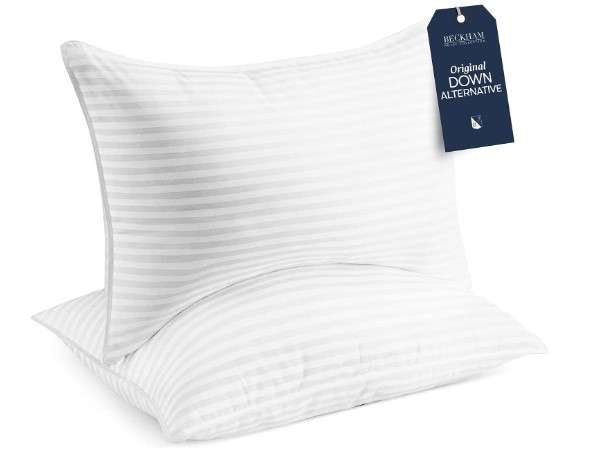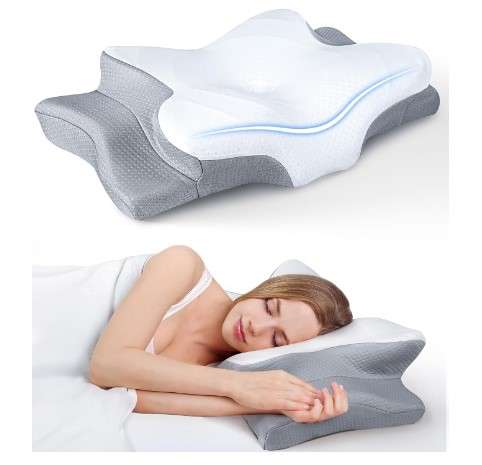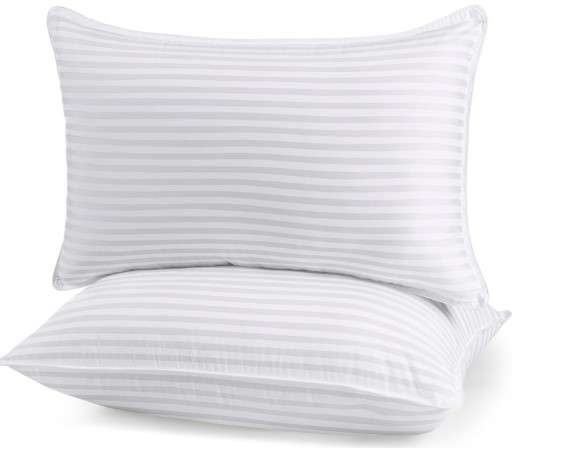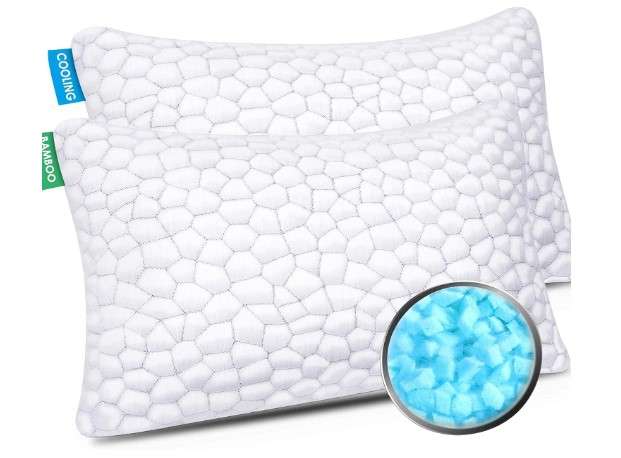Pillows for sleeping are essential to achieving a restful night and waking up refreshed. With countless options on the market, finding the perfect pillow can feel overwhelming.
Whether you prefer memory foam, down, or hypoallergenic options, the right pillow can significantly improve your sleep quality and overall well-being.
Explore our comprehensive guide to discover the best pillows tailored to your unique needs. Read on to find more and get inspired to elevate your sleep experience to new heights.
Benefits of Using Pillow for Sleeping
- Enhanced Comfort: Pillows provide support and cushioning, making sleeping more comfortable by reducing pressure on your head, neck, and shoulders.
- Improved Spinal Alignment: Proper pillow support helps maintain the natural curve of your spine, reducing the risk of neck and back pain.
- Better Sleep Quality: A good pillow can enhance sleep quality by ensuring proper alignment and reducing discomfort, leading to more restful and uninterrupted sleep.
- Reduced Snoring: Elevating your head with a pillow can help keep your airways open, potentially reducing snoring and improving breathing during sleep.
- Allergy Relief: Hypoallergenic pillows can help reduce exposure to allergens such as dust mites, providing relief for individuals with allergies and improving overall sleep hygiene.
5 Best Pillows Guaranteed to Improve Your Sleep
1. Beckham Hotel Collection Bed Pillows Standard / Queen Size Set of 2

The Beckham Hotel Collection Bed Pillows in Standard/Queen Size, available in sets of two, provide a sumptuous sleeping experience. Crafted with a unique down substitute filling, these pillows give the ideal blend of support and softness for back, stomach, and side sleepers.
They are designed with gel cooling technology to adjust temperature throughout the night, providing a comfortable sleeping environment. The hypoallergenic material is great for individuals with sensitivities, and the velvety texture promotes relaxation.
Whether you choose to sleep on your back, stomach, or side, these pillows adjust to your individual sleeping position, promoting optimal spinal alignment and minimizing pressure spots. Enhance your sleep routine with the Beckham Hotel Collection Bed Pillows, which are created for maximum comfort and refreshment.
2. Ultra Pain Relief Cooling Pillow for Neck Support

The Ultra Pain Relief Cooling Pillow, which is designed to provide ideal neck support and ease discomfort, offers unrivaled comfort. With adjustable cervical characteristics, this pillow provides a personalized sleeping experience based on your preferences.
The unique contour memory foam conforms to the curvature of your neck, encouraging optimum spinal alignment for side, back, and stomach sleepers equally. Its orthopedic design improves sleep quality by reducing pressure points, and the cooling technology keeps you cool all night.
Say goodbye to sleepless evenings, as the odorless substance ensures a peaceful sleep environment. This pillow is the perfect answer for neck pain alleviation or simply getting a good night’s sleep. Embrace the soft embrace of this ergonomic masterpiece and wake up refreshed and energized every morning.

3. Utopia Bedding Bed Pillows for Sleeping Queen Size (White), Set of 2

The Utopia Bedding Bed Pillows for Sleeping in Queen Size provide a comfortable night’s sleep thanks to its high quality and careful design. This set of two pillows is designed to accommodate a variety of sleeping preferences, providing exceptional comfort for back, stomach, and side sleepers.
Their cooling qualities create a calming sensation, improving overall sleep quality. Whether you choose to sleep on your back, stomach, or side, these pillows easily adjust to your resting position, offering ideal support and alignment for your neck and spine.
Encased in a pure white cover, they not only improve the aesthetics of your bedding but also maintain a hotel-quality level of luxury. Say goodbye to restless nights and hello to revitalizing slumber with the Utopia Bedding Bed Pillows—a foolproof solution to turn your bedtime ritual into a magical vacation.
4. DONAMA Cervical Pillow for Neck and Shoulder

The DONAMA Cervical Pillow for Neck and Shoulder provides a customized solution for a pleasant sleep. Made of contour memory foam, it fits to the natural curves of your neck and shoulders, offering ideal support and alignment all night.
Its ergonomic design accommodates all sleeping positions, including side, back, and stomach. The pillow’s careful design relieves pressure points, minimizing neck and shoulder pain commonly associated with poor sleeping posture.
It is accompanied by a soft, breathable pillowcase, which adds comfort and maintains a sanitary sleeping environment. With the DONAMA Cervical Pillow, you’ll wake up feeling refreshed and invigorated, ready to face the day with new energy and vitality. With this unique sleep solution, you can say goodbye to restless evenings and hello to calm slumber.
5. Cooling Bed Pillows for Sleeping 2 Pack Shredded Memory Foam Pillows

Our Cooling Bed Pillows for Sleeping provide unsurpassed comfort. This two-pack of Shredded Memory Foam Pillows has been carefully crafted to give customized support for every sleep position. Whether you sleep on your side, back, or stomach, these pillows will easily accommodate your needs.
The revolutionary design contains cooling bamboo fabric, providing a refreshing sensation throughout the night, ideal for hot summer evenings. Luxurious gel-infused technology provides an additional layer of relaxation, enabling deeper, more restful sleep.
The Queen Size Set of 2 provides plenty of space for maximum comfort and relaxation. Furthermore, with a washable detachable cover, upkeep is simple, keeping your pillows fresh and clean. Enhance your sleep experience with these quality cooling pillows, and you’ll wake up feeling refreshed every morning.
How to Choose the Right Pillow for You
The first step to choosing the right pillow is to figure out what you need in a pillow. Here are a few things to consider:
- Your sleeping position. The type of pillow you need will depend on your sleeping position. Side sleepers need a pillow that is thick enough to support their head and neck, while back and stomach sleepers need a flatter pillow.
- Your body type. Your body type can also affect the type of pillow you need. People with a larger head or neck may need a thicker pillow, while people with a smaller head or neck may need a flatter pillow.
- Your personal preferences. Some people prefer soft pillows, while others prefer firm pillows. There is no right or wrong answer, so it’s important to find a pillow that feels comfortable to you.
The Different Types of Pillows
There are many different types of pillows on the market, each with its own unique benefits and drawbacks. Here are a few of the most popular types of pillows:
- Down pillows are made from the feathers of geese or ducks. They are very soft and fluffy, and they provide excellent support. However, they can be expensive and they are not hypoallergenic.
- Feather pillows are made from the feathers of geese or ducks. They are less soft and fluffy than down pillows, but they are more durable and they are hypoallergenic.
- Polyester pillows are made from synthetic materials. They are less expensive than down or feather pillows, but they are not as soft or fluffy. They are also not as durable or hypoallergenic.
- Memory foam pillows are made from a viscoelastic polyurethane foam that conforms to the shape of your head and neck. They provide excellent support and they can help to relieve neck pain. However, they can be expensive and they may not be suitable for everyone.
- Latex pillows are made from natural or synthetic latex. They are firm and supportive, and they can help to relieve neck pain. However, they can be expensive and they may not be suitable for everyone.
Pillow Materials and Their Benefits
The material that your pillow is made from can have a significant impact on its comfort and support. Here are a few of the most common pillow materials and their benefits:
- Down is a natural material that is very soft and fluffy. It provides excellent support and it is hypoallergenic.
- Feather is a natural material that is less soft and fluffy than down. It is more durable than down and it is hypoallergenic.
- Polyester is a synthetic material that is less expensive than down or feather. It is not as soft or fluffy as down or feather, but it is durable and it is hypoallergenic.
- Memory foam is a viscoelastic polyurethane foam that conforms to the shape of your head and neck. It provides excellent support and it can help to relieve neck pain.
- Latex is a natural or synthetic material that is firm and supportive. It can help to relieve neck pain.
Pillow Shapes and Their Uses
The shape of your pillow can also affect its comfort and support. Here are a few of the most common pillow shapes and their uses:
- Rectangular pillows are the most common type of pillow. They are suitable for all sleeping positions.
- Square pillows are also a popular choice. They are slightly wider than rectangular pillows, and they are ideal for side sleepers.
- Contour pillows are designed to conform to the shape of your head and neck. They are ideal for people with neck pain or other neck problems.
- Travel pillows are small and lightweight pillows that are designed for travel. They are ideal for people who sleep on planes, trains, or in cars.
Pillow Firmness and Its Importance
The firmness of your pillow is another important factor to consider. The best pillow for you will depend on your personal preferences and your sleeping position.
- Side sleepers need a pillow that is thick enough to support their head and neck. A pillow that is too soft will not provide enough support, and a pillow that is too firm will be uncomfortable.
- Back sleepers need a flatter pillow that will not put pressure on their neck. A pillow that is too thick will cause their head to tilt back, which can lead to neck pain.
- Stomach sleepers need a very flat pillow or no pillow at all. A pillow that is too thick will cause their head to tilt back, which can lead to neck pain.
Pillow Support and How to Find the Right Amount
The amount of support your pillow provides is another important factor to consider. The best pillow for you will provide the right amount of support for your head and neck
Pillows for Side Sleepers
Side sleepers need a pillow that is thick enough to support their head and neck. A pillow that is too soft will not provide enough support, and a pillow that is too firm will be uncomfortable. The best pillow for side sleepers will be about 4-6 inches thick.
Conclusion
To summarize, choosing the ideal pillow for sleeping is a very personal decision impacted by individual preferences, sleeping positions, and unique requirements.
Throughout our investigation, we’ve highlighted crucial factors such as material, loft, and support, underlining the necessity of finding a pillow that suits your specific sleeping habits.
Whether you prefer the soft luxury of down pillows, the stability of memory foam, or the breathability of latex, there are numerous options to suit your preferences. Furthermore, choosing hypoallergenic materials and customizable features can improve your sleeping experience.
Finally, investing time and effort in picking the appropriate pillow will dramatically improve your sleep quality and overall well-being, ensuring that you wake up feeling refreshed and renewed every morning.
Are feather pillows good for sleeping?
Feather pillows have long been prized for their luxury texture and cloud-like softness, but do they genuinely promote a good night’s sleep? Let us explore into the feather-filled domain to discover their suitability for sleep.
For starters, feather pillows provide a distinct combination of support and plushness, making them suitable for a wide range of sleeping styles.
The natural loftiness of feathers enables for easy adjustment, conforming to the curves of your head and neck for customized comfort. This adaptability enables optimal spinal alignment, which is essential in reducing neck and back pain.
Furthermore, feather pillows excel at temperature management, which is an important consideration for uninterrupted sleep. Their airy structure allows air to circulate easily, reducing heat accumulation and keeping you cool all night.
This breathability also aids in the wicking of moisture, reducing discomfort from perspiration and creating a dry, comfortable sleeping environment.
In addition to their comfort-enhancing qualities, feather pillows are extremely durable when properly cared for. High-quality feathers keep their resilience over time, holding their shape and providing support for extended use. This lifetime equates to a fantastic investment in your sleep quality, eliminating the need for regular pillow replacements.
However, it is important to recognize that feather pillows may not be appropriate for everyone. Individuals who are allergic or sensitive to feathers may experience discomfort or an increase of symptoms. Hypoallergenic alternatives, like as down or synthetic fillings, provide comparable softness while reducing the risk of allergic responses.
In conclusion, feather pillows might be a fantastic alternative for sleep enthusiasts looking for a perfect balance of support and enjoyment. Their natural breathability, versatility, and durability make them a viable candidate in the sleep accessory category, giving a luxurious sanctuary for rejuvenating sleep.
How often should I replace my pillow for optimal sleep comfort?
To guarantee best sleep experience, evaluate your pillow’s longevity. While there is no one-size-fits-all answer, various factors influence whether to replace your pillow.
First, analyze the type of pillow you own. Different materials have varying degrees of durability. For example, memory foam pillows last longer than down or polyester-filled cushions. Regardless of the material, pillows tend to acquire dust, dead skin cells, and moisture over time, reducing their effectiveness and cleanliness.
Next, analyze your sleeping habits and preferences. If you sleep in the same position every night, your pillow may wear down more quickly in specific regions, resulting in uneven support. In addition, if you have allergies or asthma, replacing your pillow on a regular basis might help reduce allergen exposure and improve respiratory health.
In addition, pay attention to physical indicators that suggest it is time for a replacement. If your pillow appears lumpy, flat, or has lost its shape, it is most likely no longer providing appropriate support for your head and neck. Similarly, waking up with stiffness, neck pain, or headaches may indicate that your pillow has reached the end of its useful life.
Experts normally recommend replacing your pillow every 1 to 2 years to ensure good sleep quality and hygiene. However, if you observe any of the aforementioned indicators of wear and tear, replace it right away.
Finally, the frequency with which you replace your pillows is determined by a variety of factors such as the pillow’s material, your sleeping habits, and physical wear. By paying attention to these elements and replacing your pillow as needed, you can assure consistent comfort and support for restorative sleep.
Are memory foam pillows better than down pillows for neck pain?
When it comes to neck pain relief, choosing between memory foam and down pillows can have a big impact on your comfort and well-being. Memory foam pillows have a supportive contour that fits to the curvature of your neck, giving targeted pressure relief and spinal alignment.
This adaptability is especially useful for people who have neck trouble because it reduces tension and discomfort when sleeping. Memory foam pillows, by cradling the neck and head in a supportive embrace, can encourage appropriate alignment, reducing tension and allowing muscles to relax fully.
Down pillows, on the other hand, have a soft, airy feel and may not provide the strong support that persons suffering from neck pain require. Down pillows may feel fluffy and pleasant at first, but they may compress over time, resulting in diminished support and potential neck and spine misalignment.
Furthermore, down pillows may not give the same level of contouring as memory foam, resulting in inadequate support for people suffering from neck pain.
Finally, the choice between memory foam and down pillows is based on personal desire and necessities. If you want to relieve neck pain by focusing on support and alignment, a memory foam pillow may be the best choice.
However, if you like a softer, more conventional feel and do not suffer from severe neck pain, a down pillow may be right for you. When choosing the best cushion for neck pain alleviation, keep sleep position, firmness choice, and any previous issues in mind.
By selecting a pillow that prioritizes comfort and support, you may improve your sleep quality and wake up feeling refreshed and renewed.
Can the material of the pillow impact allergies or respiratory issues?
Yes, the material of your pillow can have a big impact on allergies and respiratory disorders. Consider this scenario: you lay down to relax, hoping to find consolation in your comfortable refuge, only to be met by sniffles and sneezes instead of drifting off to sleep. This predicament is frequently the unpleasant result of an unnoticed culprit: your pillow’s fabric.
Let us break it down. Traditional pillows frequently house a slew of allergies, ranging from dust mites to mold and mildew, all nestled in the fibers. These minuscule irritants can cause allergic reactions and worsen respiratory problems, resulting in discomfort and sleep difficulties.
Hypoallergenic materials are the heroes of the pillow world. Choosing pillows made from hypoallergenic materials like bamboo, latex, or certain types of foam can greatly limit allergy exposure. These materials have natural qualities that repel dust mites and mold, producing an unfavourable environment for allergens to develop.
But wait—there’s more! Some pillows go above and above by including specific features such as moisture-wicking properties, which keep allergens dry and out. Furthermore, purchasing pillows with removable, washable covers simplifies maintenance and helps keep allergy levels under control.
To summarize, yes, the material of your pillow is really important when it comes to allergies and respiratory disorders. By investing in hypoallergenic choices and performing basic pillow cleanliness, you may sleep soundly knowing that your sleeping environment is working in tandem with your health, not against it.

